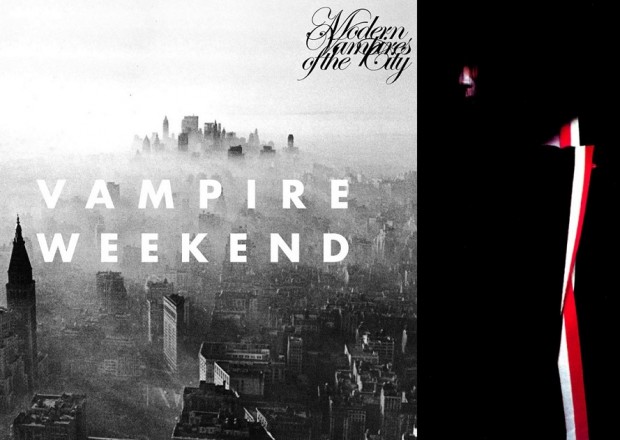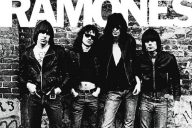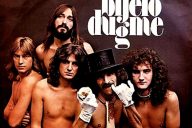A middle-aged man wistfully trying to recapture past glories, hoping to relive the electric charge of youthful adventure, manfully staring down the growing sense of his own obsolescence.
A shiny red sports car for some, an affair with the office receptionist for others, but for the sad case that is the music lover, the record collector, the vinyl crate digger turned hard drive file hoarder, it’s often a matter of making a vain play for relevance, staying “hip” to the contemporary music scene.
No longer equipped with the stamina, time nor motivation to see three or four shows a month (let alone the three or four a week you did when the fever ran really hot), the middle-aged music lover settles for “choice cuts” and hardy perennials.
The thrill of the chase has subsided.
Consigned to sepia memory, the afternoons once spent flicking through rows of mold-tinged albums, sitting on dirty record store floors in the hope of finding some elusive gem for $2 a pop in the bargain crates — Phase Two by the Jimmy Castor Bunch, In Color by Cheap Trick, MOOG: The Electric Eclectics of Dick Hyman by Dick Hyman.
But once in a while there’s an aural tickle that may be more than just the tinnitus kicking up a notch.
Beyond the endless parade of hucksters reviving sounds first revived by hucksters twenty or so years ago already, beyond the latest fad sound championed by whatever passes for the music press these days, beyond the bland army of bands looking to strike commercial gold by getting a song in an Apple ad, sometimes, when the fortress of cynicism buttressed by years of promo drool and spiel cracks just a little, a new band of intrepid hucksters is given entrée to the hardened heart of the veteran music lover.
We Can’t Dance Together…
I feel a little like the protagonist in Steely Dan’s sleazy ’70s classic “Hey Nineteen”:
“Hey Nineteen
No we can’t dance together
No we can’t talk at all
Please take me along
When you slide on down.”
It is not an altogether strange thing for me to feel like the protagonist in a Steely Dan song. I’ve overcome the antipathy many music fans have for the Dan and now wear my “Dandom” with the type of kindergarten pride that has become the irreconcilable starting point for most of what passes for contemporary debate and conversation — if you don’t dig my thing then you’re a “hater” or “troll”.
The great levelling of our times — fathered by rights movements, mothered by technology, ushered to the light by postmodern theory — has allowed us all to indulge in the dandy conceits of snobbery.
“Snob: A pretty little round word, all composed of soft letters, with a hiss at the beginning, just to make it piquant, as it were.” — William Makepeace Thackeray, The Book of Snobs.
I digress a little, but not a lot.
Because a little while ago I became hip to the now sounds of a groovy beat combo called, you’re going to love this, Vampire Weekend. Doesn’t that name just blow your mind!
And in a strange, roundabout way this band displayed a certain simpatico (as Dean Martin might have put it) with the musical and sociocultural motifs that have informed my Steely Dan fixation. In Vampire Weekend, I recognised not the similarities in sound with SD so much as the alignment in modes of being.
Here was a little red sports car that understood my drive to be free; here was a pretty, quirky office receptionist who laughed at my jokes; here was a band that stroked my music snob conceits.
The Whitest Band in the World
I’m not Robinson Crusoe on this island. There are others here, sipping their Black Cow or Horchata. Here’s Craig Outhier’s take on Vampire Weekend’s “whiteness” and brightness:
There are plenty of musical antecedents to the Vampire Weekend whiteness throne: Talking Heads, Paul Simon, Barenaked Ladies, to name but a few. Another good one, arguably, is Steely Dan. When the Dan hit the scene in the early ’70s, they didn’t sound particularly white, with their jazz-influenced compositions and soul-sistah backing singers. But once you listened to the lyrics, it was whiteness personified: Cuervo and Haitian divorces and sly ruminations about their glory days at Bard College.
I’ll just get Man Friday to make us another drink, shall I.
And while we wait for our refreshments, here’s what NPR music critic Ken Tucker says about the two bands: “The New York City band Vampire Weekend has carved out a sense of immaculate melancholy for our era as surely as Steely Dan once did for Upstate New York in the ’70s.”
What Outhier and Tucker hit upon is that both bands have “hipster” DNA. While the term hipster has popularly become a catch-all pejorative to excoriate anyone between the ages of 18 and 30 who might be wearing slightly tight pants and an off-kilter haircut, there’s a nobler strand to this close to 60-year-old urban culture than just fashion accoutrements and speech affectations.
Steely Dan’s Donald Fagen weighed in recently with his own compendium of hip wisdom in his book Eminent Hipsters. The book is half tour diary, half collection of essays on music and films. In the best hipster tradition, it deals with subjects both mundane and profound, obscure and commonplace, going from 1920s jazz harmony group the Boswell Sisters to sharing a tour bus with Michael McDonald and Boz Scaggs.
Fagen acknowledges the multifaceted nature of the hipster project and defines it in a way that makes sense beyond its contemporary paradox of parody and authenticity:
There are countless definitions of the word “hipster”. In the title of this book, I’m using it to refer to artists whose origins lie outside the mainstream or who creatively exploit material from the margin or who, merely because they live in a freaky space, have enough distance to see some truth.
It’s a definition which holds some truth for both Steely Dan and Vampire Weekend.
Musically, Steely Dan are indebted to the rock, jazz and soul of their youth in the 1950s and ’60s. This music — artists like Bob Dylan, Ray Charles, Miles Davis — laid the bedrock for the band’s sound. But, being musical magpies, Fagen and his writing partner, Walter Becker, incorporated a diverse array of elements such as Hawaiian and country pedal guitar, Henry Mancini orchestrations and heavier rock guitar styles to create their urbane, cosmopolitan sound.
Pretentious fakes or fake pretensions
In the Classic Albums documentary on the making of Aja, the album many regard as the band’s magnum opus, Fagen talks about how he and Becker loved and respected “real jazz, fake jazz and fake fake jazz”.
For Fagen and Becker, the dogmatic notions of authenticity that made folk fans go rabid when Dylan plugged in and went electric made no sense. Whether it was the real jazz of Oliver Nelson’s 1961 classic The Blues and the Abstract Truth, or the fake jazz of a Henry Mancini soundtrack for the Pink Panther or Peter Gunn, what was important was not the supposed realness of the work, but what the music said, and how it said it, in a given context.
While Steely Dan plundered the jazz, soul and R&B of its times, Vampire Weekend seems to have found its source code in African guitar music, hip hop and college rock. It makes sense that a contemporary band with similar instincts to Steely Dan would have moved on from the old musical landmarks to new vines of musical fruit.
Critics were quick to raise the question of cultural appropriation when Vampire Weekend first rose to prominence on the back of their self-titled debut album. What galled many critics was the mix of “authentic” sound (African guitar) with lyrics that detailed the lives and loves of a preppy milieu that smacked of a New York filmic and literary tradition that includes the likes of Wes Anderson, Whit Stillman, Jay McInerney and even, going back some ways, JD Salinger.
Of course artists such as Talking Heads, Peter Gabriel and, perhaps most famously, Paul Simon have been dipping into the African well for musical inspiration, but Vampire Weekend provoked an especially strong response from those critics who thought the band had no business playing African music. These critics merely echoed the same sort of criticisms that were once levelled at Steely Dan for taking “authentic” jazz and turning it into a lifestyle soundtrack for louche middle-aged white guys with a thing for women half their age.
While Steely Dan took their love of real, fake and fake fake jazz and made it into something entirely their own, Vampire Weekend have also taken their love of real, fake and fake fake African music and turned it into something that is entirely them. This is a musical reduction of both bands because as mentioned before, the sound palette for both bands is far wider than just jazz or African music.
Another thing that the two bands have in common is a fixation with getting things right in the studio, as Vampire Weekend’s Ezra Koenig told AltMusic: “Because, even when we were making the first album, and nobody really cared about us, we were still pulling our hair out about getting the vocals sounding right. It’s all internal to us.”
Vampire Weekend still have a couple of albums in which to catch up to the levels of perfectionism that Steely Dan infamously reached in the ’70s with their studio band extravaganzas like Aja and Gaucho but the attitudes are uncannily alike.
Talking about the first Steely Dan album, Can’t Buy A Thrill, Walter Becker said in Brian Sweet’s biography of the band, Reelin’ In The Years: “We were doing the best we could, but fuck it, it wasn’t very good. It’s like looking at yourself in a mirror, it’s not really how you look. I don’t know whether it is ultimately good or not, I really don’t.”
“I Feel It In My Bones”
Maybe this is just a middle-aged music nerd’s fleeting crush on the spunky, funky new thing; a sad and tawdry attempt at keeping up with the kids. This need might pass to validate a slightly embarrassing, unseemly admiration for a “young people’s band”, when I should be off listening to whatever Dad Rock it is I should be interested in.
My fascination with the boppy rhythms of “Oxford Comma” and the smart and funny surrealism of “Step”, these things might be temporary, a transient aural tickle satiated by its indulgence. It doesn’t really matter. I can enjoy this dalliance for whatever it is, knowing full well I can always return to my first love, Steely Dan.
“Hey Nineteen
That’s ‘Retha Franklin
She don’t remember
The Queen of Soul
It’s hard times befallen
The sole survivors
She thinks I’m crazy
But I’m just growing old.”
















